Uzbekistan's Grand Mufti, Usmankhan Alimov, visited the United States for the first time this week. He and other Uzbek officials held high-level talks at the White House, Congress, and the State Department. They also had meetings with other stakeholders in Washington, including from the ranks of think tanks and civic groups. Discussions evolved around the level of religious freedom in Uzbekistan, which continues to worry the human rights community. The Mufti visited U.S. mosques and prayed alongside American Muslims. He spoke in Islamic centers. The delegation also included officials such as Senator Alisher Kurmanov, Akmal Saidov, a lawmaker who heads up Uzbekistan’s National Human Rights Center, and Shoazim Minovarov, who runs the Islamic Civilization Center in Tashkent. In an exclusive and unprecedented interview with VOA Uzbek’s Navbahor Imamova, the Mufti described the reforms regarding religious freedom as a critical necessity. "We will not fight evil with evil. We will fight it with enlightenment," he said.
Here are the highlights from VOA Uzbek interview, which took place at the Uzbek Embassy in Washington, D.C., May 21, 2019:
- The Mufti thinks Uzbekistan and the United States are in sync on the importance and perception of religious freedom.
- The Mufti sees America as a powerful supporter of reforms in Uzbekistan, as a strategic partner in not only political but social and cultural issues too.
- Uzbekistan does not want to end up as a “Country of Particular Concern” again. The dialog continues with the U.S. government which kept it in that status for years before taking it off recently. But Tashkent knows that Washington and the international community are closely watching. “We strongly believe reforms will deliver positive results.”
- The Mufti doesn't divide education into secular or religious. "But religious education is fine and evolving": 12 Islamic educational outlets - 3 higher educational institutions and 9 specialized schools with 2 of them being specifically for girls.
- 5 new Islamic schools around the country, focusing on specific fields such as Kalam, Hadith, Fiqh, Aqida and Tasawwuf. Christian schools: Orthodox Theological Seminary and Christian Seminary, both based in Tashkent.
- The Mufti puts education above faith. "First comes education and then faith, always."
- That is how he explains the dominant (mostly official) view in the country that children should go to school instead of mosques.
- But the Mufti maintains that all mosques are open for children. No restrictions as far as his office is concerned and his office runs the mosques.
- Imams are educators, the Mufti says. They are paid now but these are not full-time positions, so imams have other means of income.
- The Mufti and his office, the Muslim Board of Uzbekistan, follow and use social media and take it seriously. Multiple channels and deep engagement. "We don't boast about what we do."
- The Mufti feels connected to the people, specifically the youth of the country. "I know their problems and the kind of issues they struggle with."
- The Muslim Board of Uzbekistan is a non-governmental entity. The Office of Religious Affairs under the Cabinet of Ministers is a bridge between the Board and the state.
- The Mufti sees his service as not only for men but women too. "Women are a very important part of our nation and whatever we do should also ease their lives."
- It is not hijab in Uzbekistan. “It is "ro'mol" [scarf], a part of our national attire.” No one is prohibited from wearing it. Women should feel free to cover their heads. But the Muslim Board will not interfere if state institutions don't allow it because of the principle of separation of the state from religious institutions.
- Religious freedom means the freedom of other believers and non-believers too, not only Muslims. Tolerance is key.
- President may pardon a number of inmates on the eve of Eid al-Fitr, the end of the Islamic month of Ramadan.
- The Mufti continues to work with the authorities to decrease the number of "religious prisoners."
- The Mufti is engaged with pardoned citizens as well as those whose names have been taken off the black list, maintained by the security services.
- The Mufti confirms that more than 20,000 citizens were removed from the blacklist during 2017-2018. 16,000 are no longer considered members of the extremist groups and have returned to normal life. About 9,500 of them have jobs now.
- The Mufti sees President Mirziyoyev as a person of strong faith, and as a leader who has the best interest of every citizen of every faith in mind.
- Vaqf is a Public Charity Fund run by the Muslim Board of Uzbekistan, which wants to promote the giving culture in the country.




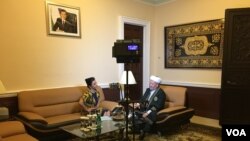
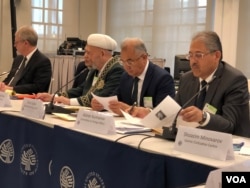
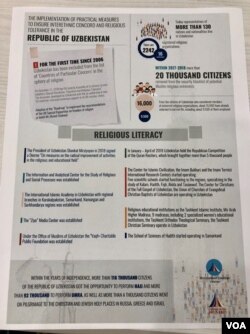
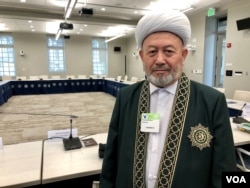
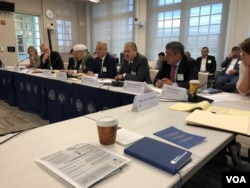
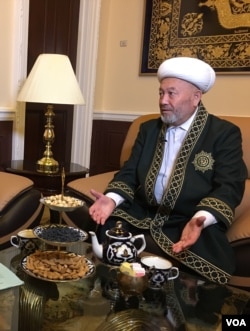
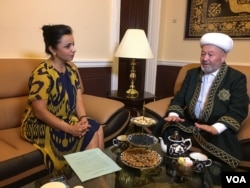



































Facebook Forum